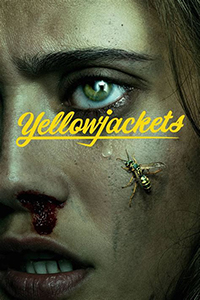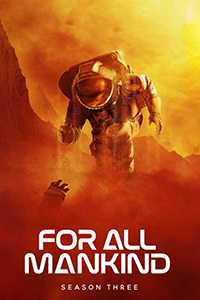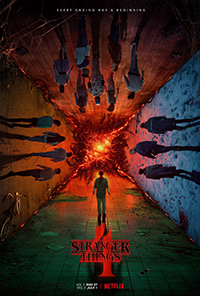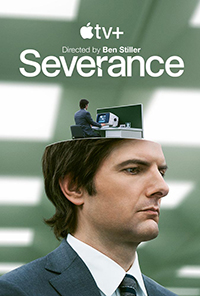Okay. Now let’s do TV shows. There were a lot of good shows this year, but after several years of The Expanse being something that I adored, I feel like none of these shows really fit the bill. And it’s true that I could keep The Expanse in the list, as its last episodes aired this year, I mentally think of it as something from last year.
Anyway, here are my top five TV shows and a handful of also-rans.
Number 5: Yellowjackets. My friend, kalmn, categorized this, approvingly, as “grim, grim, grim and also lesbians.” And, yeah, that’s probably not inaccurate. Yellowjackets is a show that takes place in two time periods. In “the past” — the mid-90s — an airplane carrying a team of high school sportsball players (“Yellowjackets” is the team name) crashes. We learn (in scenes set in the present) that the kids were stuck in the wilderness for 19 months, and we know from the creepy opening scene that things go bad and there’s ritualistic cannibalism. But beyond that opening scene, we mostly don’t see the past storyline being too horrible (just horrible enough). In “the present” — essentially the current day — we follow four of the survivors, now adults. We’re clued in pretty early that although they were eventually rescued, they mutually agreed to a somewhat light-on-details story of how they managed to survive. One of the survivors is Misty, played by Christina Ricci, who is upbeat, cheerful, super resourceful but also clearly a sociopath. And as much as the other three adult survivors want nothing to do with Misty, Misty is not the sort of person who doesn’t get her way. Through the first season, we get to see the slow devolution of the community of high school students stuck in the wilderness. By the end, things are becoming bad but it hasn’t gone too far off the rails. But, like I say, we’ve had a peek at how bad it ultimately becomes. In the present, we’re seeing that none of the adult survivors are in a good place either. And there are lots of other characters from the past that we don’t know anything about: did they survive? Did they get eaten? It’s similar to the Amazon Prime series, The Wilds, but I enjoyed Yellowjackets a lot more.

Number 4: Barry. I confess that I don’t often love comedies. I think my sense of humour is idiosyncratic enough that a lot of popular comedies just don’t work for me. So, I feel like it’s unusual for me to include a comedy in my top shows. I like Barry: it’s just the right mixture of dark-humoured and absurd. The premise is that Barry Berkman is an ex-marine who is depressed and lacks self-awareness. Since leaving the marines, he’s been making a living working for an old family friend, Fuches, as a professional killer. Fuches is a pretty manipulative guy, and likes that he can use Barry as a way to make money. Unfortunately for Fuches, in the first episode, Barry has to go to LA to kill someone on behalf of the Chechan mob, and while there, Barry stumbles into an acting class being taught by largely-forgotten actor Gene Cousineau. To Barry, acting class seems like the path to processing his feelings and he wants to leap head-first into becoming an actor and leave his professional killer days behind him. But that first hit with the Chechen mob didn’t go quite as well as all parties would have hoped and tying up those loose ends just seem to keep Barry in “the biz” longer than he wants. The first season was pretty good. I barely remember the second season. But the third season had me in stitches. I’m also interested in the portrayal of the main character: Barry is, in many ways, likeable because… y’know… narrative focalization. But he also struggles with real anger issues that are a little bit unsettling. That’s a real tightrope to walk for a comedy lead.

Number 3: For All Mankind. I think this show deserves way more acclaim than it gets. Season one started slow, but got stronger toward the end. Season two was similar: slow start, but dynamite by the end. Season three was amazing right out of the door. Many of Chekhov’s guns that were set up in earlier seasons finally came off the wall. and it was jam-packed with interesing space adventure. The premise of the show is that, back in the 1960s, the USSR became the first nation to land someone on the moon, before the US. As a result, the US approaches the space program with a “we must restore our besmirched honour” mentality and throws a tonne of money and pressure at NASA. What emerges is a world in which the space race becomes one of the main fronts in the Cold War, and we follow an alt-history of NASA. At first, the world looks a lot like our world, but over time, it diverges more and more. Nixon loses his second term to Ted Kennedy. Kennedy loses to Reagan (voted in four years early in 1976). NASA establishes a moonbase. The USSR follows suit. In three seasons, we’ve moved from the 60s to the 90s, and now Mars in on the table. Not only are both the USSR and the US racing to get to Mars first, but a private company (not quite Space X, but there’s a resemblance) is also planning its own Mars mission. My only complaint about season three is that one of my favourite characters was essentially written out in an unsatisfying way.

Number 2: Stranger Things. I’m sure everyone knows about this show, now. All of the eighties movies — The Goonies, Firestarter and so forth — have been put in a blender and mixed together into a series that’s one part “kids on bikes” and one part “horror mystery” and one part “secret government experiments”. I’ve liked Stranger Things since the beginning, but this season felt like the strongest since season 1. I found myself reflecting, a lot, on how generally smart the characters were. Once they had figured out enough of the goings-on, they were able to make a good plan for how to deal with latest threat. The characters were all clear about what needed to be done; there was no attempt to say “let’s just let this be someone else’s problem”; and they didn’t do the whole, “let’s just go in there, and we’ll win through the power of spunkiness and good luck” thing. They had a concrete plan, with comprehensible milestones, and they executed it. Of course, external forces were against them, forcing them to improvise somewhat, but the kids were smart. Nancy was badass this season. Dustin continues to be the problem solver. Lucas had a nice storyline that started with him leaving the comfort of the D&D table in favour of the seedy and cutthroat world of sportsball. New character, Eddie, managed to steal almost every scene he was in. They even managed to throw in the 80s Satanic Panic. I also liked how its queer representation was handled. Last season, we learned that new character, Robin, who seemed like the new love interest for Steve, was gay (that scene where she comes out to him is perfection). This season, Steve is being the world’s best wingman for Robin. But it’s interesting that, true to being queer in the 80s, Steve isn’t telling the gang about Robin’s sexuality, and nobody’s guessing it on their own. Similarly, they’ve upped the obviousness of Will Byers’ gayness and unrequited love for his straight best friend, Mike. This season they broke up the characters into different groupings: the adults — Joyce, Hopper, and Murray — are still mostly grouped together in the least interesting Russian storyline. But the younger characters are in a few different clusters: I think that these actors have busier schedules than when they made season 1, so characters like Mike and Eleven are mostly separate from some of the others. All around, a strong season.

Number 1: Severence. This show. You can get the premise from the trailers: a large corporation has created a medical procedure that allows you to “sever” your memories between your work life and your home life. That means that you can’t remember any personal details while at work, and you can’t remember anything to do with work when you’ve left the office. Why would someone want to do that? Well, you really can leave your work at the office. And companies like the idea because it provides protection against intellectual property being stolen. The first episode introduces the premise, and takes us up to the point of discomfort with the idea. And I watched that, and thought, “oh, this is interesting. But how can they make a whole season out of this premise?” But, holy fuck, did that season delve into some really amazing, but uncomfortable-making stuff. I don’t want to get into spoilers, but the show does such an interesting job of deconstructing the worst parts of corporate culture (including, especially, corporate “fun” activities, like the “five minute Music/Dance Experience”). I ended up bingeing it a lot more quickly than I had planned. By the time I finished the second-last episode, it was already 20 minutes past my bedtime, but it ended with such an important event, that I couldn’t bear to stop, and kept going. Much like I wondered “how are they going to make a full season out of this?”, I also wonder, “where can they possibly go in a second season?” And yet, a second season is in the works. I’ll be there for it.

There were a bunch of other shows that I enjoyed this year, that didn’t quite make the top 5. It’s been a good year for Star Trek. Two shows were especially strong: Strange New Worlds and Prodigy. Unlike many first seasons of new Star Trek shows, they were both incredibly strong, and very different from each other. Prodigy is very YA, but nonetheless tells its story well and is not afraid of showing off its love for Star Trek history. I was prepared to dislike Strange New Worlds (because it seemed like it was designed to appeal to people who whine that Discovery is too diverse), but I ended up loving it.
The Time Traveler’s Wife is a story with a lot of problematic elements, and the latest adaptation is clearly trying to acknowledge and address those elements. It isn’t always perfect, but it’s a pretty good adaptation.
But while we’re talking about stories with problematic elements, the new adaptation of Interview with the Vampire is soooo much better than the book (and the movie adaptation). The changes that they’ve made to the story — the time setting, the blackness of Louis, and especially the changes to the reporter character — make the story so much stronger. And it’s so wonderfully gay; I’m there for it. “Did you eat the baby?”
Quantum Leap is not a terribly deep show, but it’s fun, and I’m enjoying it. I especially love Mason Alexander Park as Ian, the cat-ear-wearing computer scientist.
And while I’m on the topic of Mason Alexander Park, I should mention The Sandman. The Sandman is a strong, surprisingly faithful adaptation of the book. I am somebody who bought issue number 1 of Sandman off the racks; I’m a fan from the beginning. (I had been exposed to the then-largely-unknown Neil Gaiman when Alan Moore selected Neil to succeed him on Miracleman which was, at the time, my favourite comic). So, to say I’m a huge fan is an understatement. Certain parts of the comic had to be changed for the series, and I thought that they mostly handled those changes well. The Lyta and Hank Hall stuff was messy, but there was probably no better way to handle that. No Glob and Brute (I’d owned several issues of the earlier Jack Kirby Sandman as a kid, and knew those characters from there). But the early Gaiman Sandman stories tied in to a lot of DC continuity that would be hard to translate into a TV adaptation (and licensing would probably be thorny). I’m not 100% sure why this isn’t in my top 5; mostly, I think, my tastes have changed since I first read the stories. There’s definitely a sense of nostalgia: “oh, I remember these stories from my youth.” They don’t connect with me quite as powerfully now. That’s odd, and a little sad-making.
I’m not generally a Star Wars fan, but Andor was pretty good agitprop.
Lastly, I was fairly disappointed by the latest season of The Crown. There were high points: Jonny Lee Miller as John Major was unexpected and, like Gillian Anderson playing Thatcher in Season 4, I found that Miller gave me an uncomfortable-making respect for the PM. The best episode of the season was, in my opinion, the episode about Mohamed Al-Fayed. I’m given to understand that, in real life, he’s a highly problematic individual, but the episode of him trying to be accepted by British society is excellent.
